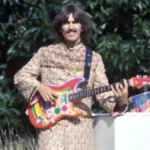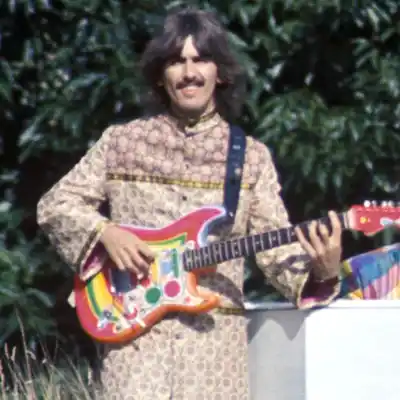
George Harrison – The Quiet Beatle With a Loud Legacy
Let’s talk about a man whose guitar gently wept and a Beatle who, while often in the shadows of Lennon and McCartney, crafted melodies that touched hearts: George Harrison.
Though he’s often dubbed “the quiet Beatle,” George’s contributions to music are anything but silent. From the sitar-infused strains of “Norwegian Wood” to the profound musings in “Something,” are a testament to his talent.
If you’ve ever hummed along to “Here Comes the Sun,” you know this man’s genius. But there’s so much more to know.
Table of Contents
Early Life and The Beatles
Born on February 25, 1943, in Liverpool, England, George’s love for music was evident from a young age.
Picking up a guitar, he strummed and plucked his way into the heart of one of the most iconic bands ever: The Beatles. Teaming up with schoolmate Paul McCartney, and later John Lennon and Ringo Starr, the quartet from Liverpool was set to change the music scene forever.
The Eastern Influence: Ravi Shankar and the Sitar
One of George’s most notable contributions to The Beatles’ sound was his introduction of Indian classical music. After being introduced to the sitar maestro Ravi Shankar, George was enamored. This led to tracks like “Norwegian Wood” and “Within You Without You,” blending the best of the East and West. But it wasn’t just about the music. George’s tryst with India also saw him delving deep into spirituality, something that profoundly influenced his life and work.
Stepping Out: The Solo Journey
While The Beatles’ journey was legendary, George’s solo career was nothing short of spectacular. Post the band’s breakup, he came into his own with the triple album “All Things Must Pass,” featuring hits like “My Sweet Lord” and “What is Life.” His music was not just about catchy tunes; it delved deep, often reflecting his spiritual and philosophical musings.
The Concert for Bangladesh
George wasn’t just a musician; he was a humanitarian. When he learned about the plight of refugees in the wake of the Bangladesh Liberation War, he organized “The Concert for Bangladesh” in 1971. With stars like Bob Dylan, Ringo Starr, and Ravi Shankar, it was one of the first-ever benefit concerts, setting the stage for many such events in the future.
Personal Struggles and Spiritual Quests
George’s life, though filled with music and accolades, wasn’t without its challenges. From battling a life-threatening illness to facing personal upheavals, he weathered many storms.
Yet, through it all, his spiritual quest remained unwavering. He delved deep into Eastern spirituality, embracing Hinduism and chanting, often reflected in his songs like “I Did Love” and “The Lord Loves the One.”
He was a devout practitioner of meditation and spent considerable time in India, immersing himself in its culture and spirituality. His estate in England, Friar Park, was not just his residence but a reflection of his deep spiritual inclinations, with its beautifully manicured gardens and serene ambiance.
Collaborations
Apart from his deep bond with Ravi Shankar, he also collaborated with Eric Clapton, who played the iconic lead guitar on “While My Guitar Gently Weeps.” Their relationship, both personal and professional, was a testament to the camaraderie shared by musicians.
George’s love for music wasn’t confined to just creating tunes; he wanted to nurture other artists and give them a platform. Hence, in 1974, he founded Dark Horse Records. This venture not only became an outlet for some of his later work but also introduced the world to a myriad of artists.
Even in the later stages of his career, George’s passion for music was undimmed. Teaming up with legends like Bob Dylan, Roy Orbison, Tom Petty, and Jeff Lynne, he formed the supergroup “The Traveling Wilburys.” Their laid-back tunes and camaraderie showcased a different side of George.
Apart from music, George had an eye for cinema. He co-founded HandMade Films, which went on to produce several British classics, including Monty Python’s “Life of Brian.”
The Final Years and Posthumous Recognition
While the later years of George’s life were marked by health challenges, his spirit remained undeterred. He continued to create music, including the critically acclaimed album “Brainwashed,” which was released posthumously and received rave reviews.
George Harrison passed away on November 29, 2001, but his legacy is immortal. From the rock-n-roll tunes of The Beatles to his soul-stirring solo tracks, his music continues to inspire.
In 2004, Rolling Stone ranked him 21 on their list of “The 100 Greatest Guitarists of All Time.”
Furthermore, in 2009, the Hollywood Chamber of Commerce honored George with a star on the Hollywood Walk of Fame, cementing his legacy as a titan of music.
But beyond the melodies, George’s life is a reminder of the power of introspection, compassion, and the quest for a higher truth.
